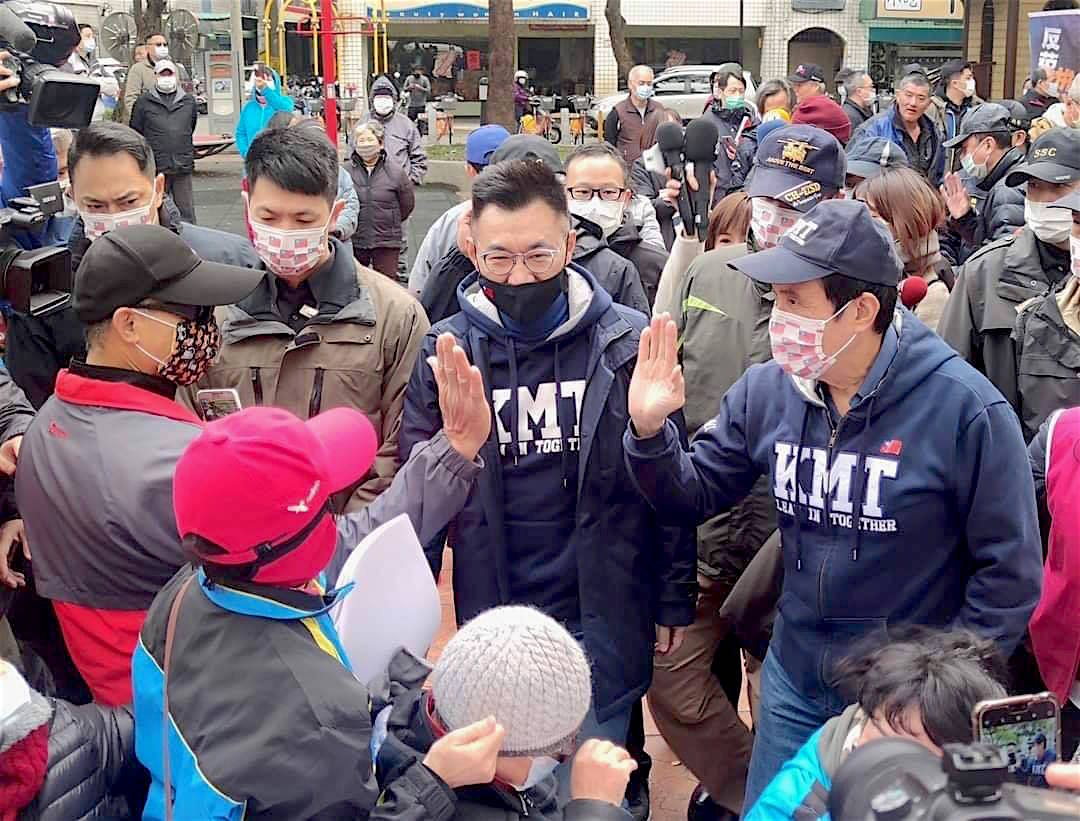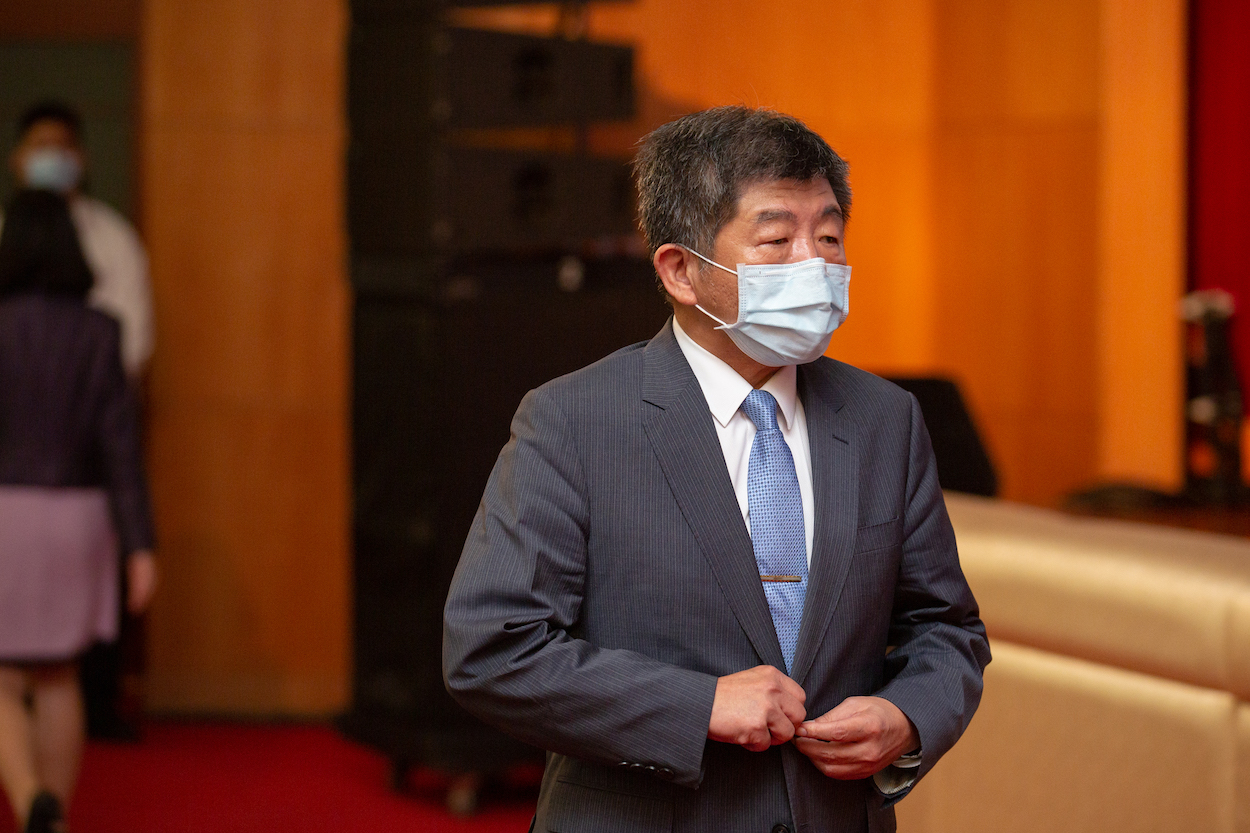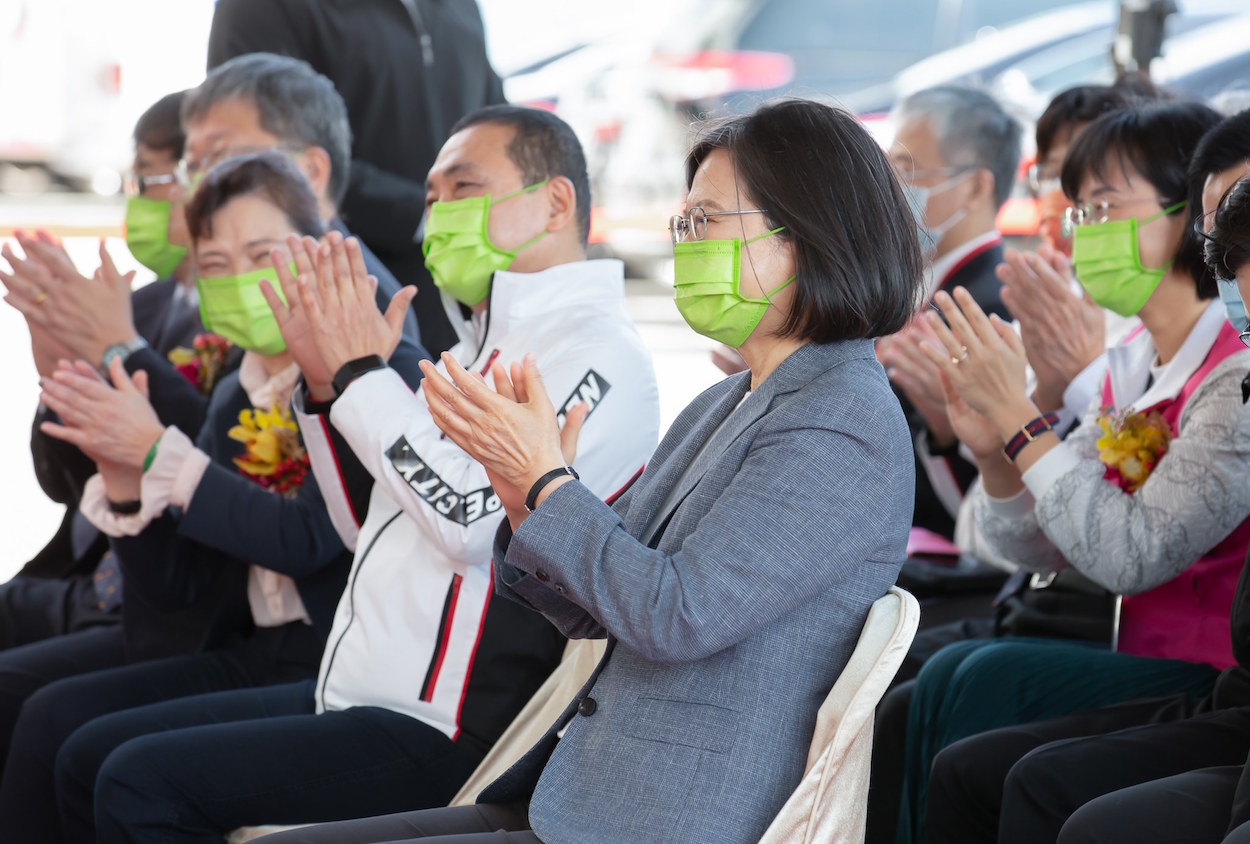by Brian Hioe
語言:
English
Photo Credit: Ma Ying-jeou/Facebook
THE LATEST FRONT on which the KMT has sought to attack the Tsai administration’s response to COVID-19 has been on the issues of vaccines. In particular, with the Tsai administration having enjoyed widespread public praise for its effective response to COVID-19, the KMT has tried to find ways to criticize or denigrate the Tsai administration’s response to COVID-19.
In recent memory, this has included calls in January to lock down the city of Taoyuan in response to the Taoyuan General Hospital cluster. At just over twenty cases, the Taoyuan General Hospital cluster was Taiwan’s largest cluster in the course of the COVID-19 pandemic, mostly consisting of medical personnel that became infected from treating patients with COVID-19.
 Current KMT chair Johnny Chiang (center) and former president Ma Ying-jeou (center-right) greeting supporters. Photo credit: Ma Ying-jeou/Facebook
Current KMT chair Johnny Chiang (center) and former president Ma Ying-jeou (center-right) greeting supporters. Photo credit: Ma Ying-jeou/Facebook
A lockdown of the city of Taoyuan would have been disruptive to the lives of Taoyuan’s 2.25 million residents and economically catastrophic to their livelihoods. A cluster case of twenty cases that were confined to the Taoyuan General Hospital would hardly warrant such an extensive lockdown, and transportation networks in Taiwan are sufficiently interlinked that locking down Taoyuan may not prevent the spread of COVID-19. In fact, individuals fleeing a lockdown could potentially spread COVID-19 even further.
But the KMT called for this anyway, to allege that the Tsai administration was lax in its measures to fight COVID-19. Ironically, attacking the Tsai administration for not doing enough to fight COVID-19 occurred despite attempts by the KMT in earlier stages of the pandemic to insist that the Tsai administration had gone too far in measures against COVID-19 and was hurting the economy, calling for Minister of Health and Welfare Chen Shih-chung to step down.
Indeed, last August, the pan-Blue camp previously sought to intimate that the Tsai administration may be hoping to cover up cases of COVID-19 in order to maintain the prestige of having fought off COVID-19. Calling for a lockdown sometimes involved similar accusations of the Tsai administration carrying out a cover-up. But, in general, one can expect the pan-Blue camp to increasingly lean into disinformation and misinformation to target the Tsai administration going forward, as shown by the issue of COVID-19 vaccines.
In the past week, former president Ma Ying-jeou has begun advocating that the Tsai administration should consider using Chinese vaccines in Taiwan. In particular, Ma has suggested that the Tsai administration is irrationally opposed to the use of Chinese vaccines. Ma has called on newly appointed Mainland Affairs Council head Chiu Tai-san, viewed as dovish toward China, to negotiate with China for Taiwan to receive Chinese vaccines.
Such statements by Ma are aimed at accusing the Tsai administration of vaccine nationalism, by way of hostility toward Chinese vaccines. However, tests show that the efficacy of Chinese vaccines is much less than that of western-produced vaccines such as the Pfizer BioNTech and Moderna vaccines, which have over 90% efficacy, by contrast to the lower efficacy of Chinese vaccines such as the SinoPharm vaccine, which has around 50% or 60% efficacy. However, the efficacy of Chinese vaccines is similar to the AstraZeneca vaccine, which is the vaccine that Taiwan will receive first, by way of the COVAX agreement. One expects Ma to leverage on this fact.
Ma and other KMT politicians, such as Central Standing Committee member Sean Lien, previously accused the Tsai administration of having failed in its vaccine acquisition strategy, citing delays in the timeline for Taiwan receiving vaccines.
 Minister of Health and Welfare Chen Shih-chung. Photo credit: Presidential Office/CC
Minister of Health and Welfare Chen Shih-chung. Photo credit: Presidential Office/CC
In particular, Minister of Health and Welfare Chen Shih-chung suggested in comments last week that Chinese government interference was responsible for delays in Taiwan receiving the BioNTech vaccine. This was due to interference from BioNTech’s Chinese distributor, Shanghai Fosun Pharmaceutical, after the Ministry of Health and Welfare attempted to purchase vaccines directly from BioNTech, without going through a distributor.
Before these comments by Chen, Ma and Lien had sought to attack the Tsai administration by pointing to the fact that BioNTech’s greater China distributor was a Chinese company and suggesting that the Chinese government was responsible for these delays. Ma and Lien were likely hoping to suggest that if the KMT was in power, there would not be such interference from the Chinese government—to this extent, some have accused the two of collusion with the Chinese government to promote this narrative, seeing as they seemed to be aware of delays caused by Shanghai Fosun before this was publicly revealed.
It proves another step for members of the KMT to now allege that the Tsai administration should use Chinese vaccines—something they previously did not do, only alleging that the Tsai administration would have easier access to western-produced vaccines if not for what KMT members have sought to frame as its hostile relation to China.
Again, despite results showing lower efficacy, the Chinese government has sought to circulate disinformation questioning the safety and effectiveness of western-produced vaccines while also downplaying reports about the lower efficacy of Chinese-produced vaccines. It should not be surprising that the KMT has followed suit with this narrative. Otherwise, KMT politicians such as Jaw Shaw-kong have alleged that the Tsai administration was acting illegally, in trying to directly purchase vaccines from BioNTech rather than going through a regional distributor, hence the delay.
Pan-Green politicians such as vice president William Lai or Chen Po-wei of the Taiwan Statebuilding Party have hit back at Ma’s comments. One notes that it is largely improbable that the Chinese government would provide vaccines to the Tsai administration, having suspended diplomatic contacts with Taiwan since Tsai took office in 2016. The Chinese government would likely only be willing to provide vaccines to a pan-Blue administration and so the KMT will probably insist down the line that China would only be willing to provide vaccines to Taiwan if it were in power.
It is to be seen how other pan-Blue parties respond to the claims of the KMT regarding the issue of Chinese vaccines. It is not impossible that the TPP will also jump on-board with such claims.
With Taiwan still isolated from the effects of COVID-19, attempts by the pan-Blue camp to attack the Tsai administration over delays in vaccine acquisition may not be very fruitful in the long-run.
 Taiwanese president Tsai Ing-wen (center). Photo credit: Tsai Ing-wen/Facebook
Taiwanese president Tsai Ing-wen (center). Photo credit: Tsai Ing-wen/Facebook
Criticisms by the pan-Blue camp regarding delays in vaccine acquisition, however, have pushed the Tsai administration into emphasizing that it intends to not only obtain western-produced vaccines, but will use domestically produced vaccines. The Tsai administration currently states that it intends to obtain 20 million doses of vaccines from abroad, with priority given to medical personnel, and to produce ten million or more domestically produced vaccines.
The efficacy of domestically-produced vaccines is still unknown and will only become clear after further testing. However, it is probable that delays in obtaining vaccines due to Chinese interference have pushed Taiwan toward greater self-reliance on the vaccine front.
While BioNTech stated after remarks by Chen alleging Chinese interference that Taiwan will indeed receive its vaccines, it is still possible that Taiwan will see further delays in vaccine acquisition due to Chinese interference. Taiwan intends to obtain a total of five million vaccines through COVAX, for example, which is partially coordinated by the World Health Organization (WHO). Taiwan is excluded from the WHO due to Chinese pressure within the organization and it cannot be ruled out that Taiwan will experience delays obtaining vaccines through COVAX due to China’s influence within the organization.
Polling by Global Views released yesterday shows that over 60% of Taiwanese are willing to take COVID-19 vaccines, but that only 1% of Taiwanese are willing to accept Chinese vaccines. Such results may be explained by that Taiwanese are distrustful of China, being aware of attempts by the Chinese government to cover up the initial COVID-19 outbreak, broader skepticism towards official Chinese statistics, and because of the lingering memory of past adulteration scandals from Chinese companies. Moreover, Taiwanese may be in no rush to take vaccines because Taiwan has been generally insulated from the effects of COVID-19. As such, it is questionable whether attempts by the pan-Blue camp to attack the Tsai administration over the issue of COVID-19 vaccines will be successful.

